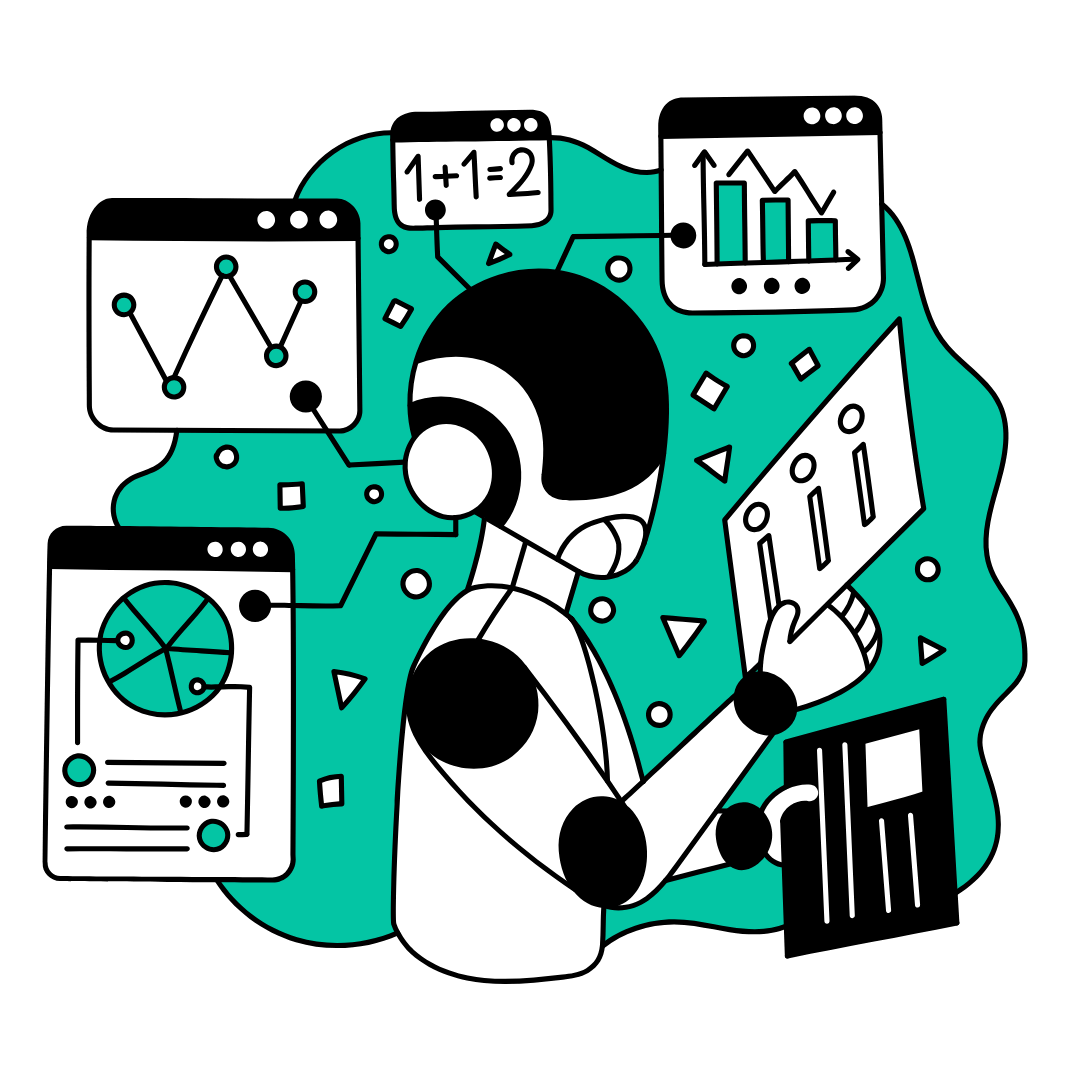Course Description: This comprehensive course is designed for individuals aiming to achieve mastery in artificial intelligence. It covers a wide spectrum of AI technologies, from foundational principles to advanced AI-driven innovations. Participants will learn to utilize AI for real-world applications, understanding its potential across various industries. The curriculum includes hands-on exercises, case studies, and detailed lessons on building, training, and deploying AI models. By the end of the course, learners will be well-equipped to handle complex AI projects, integrate AI solutions in business environments, and stay ahead of technological advancements.
Total Duration: 20 Subjects
Subject 1: Foundations of AI Mastery
Lesson 1.1: Understanding Artificial Intelligence
Defining AI, its history, and its evolution over time.
Lesson 1.2: Key AI Concepts and Terminologies
Introduction to machine learning, neural networks, deep learning, and other core AI topics.
Subject 2: AI Technologies Overview
Lesson 2.1: Machine Learning vs. Deep Learning
Exploring the differences and use cases for each AI approach.
Lesson 2.2: Natural Language Processing (NLP) Basics
Fundamentals of NLP and how it’s changing communication with AI.
Subject 3: Data Handling for AI
Lesson 3.1: Data Collection and Storage
Best practices for gathering and storing high-quality data for AI models.
Lesson 3.2: Data Preprocessing and Feature Engineering
Cleaning, organizing, and selecting data features for optimal AI performance.
Subject 4: Building Machine Learning Models
Lesson 4.1: Supervised Learning Techniques
In-depth exploration of algorithms like decision trees, SVMs, and k-NN.
Lesson 4.2: Unsupervised Learning Techniques
Detailed study of clustering, dimensionality reduction, and anomaly detection.
Subject 5: Advanced Deep Learning Techniques
Lesson 5.1: Convolutional Neural Networks (CNNs)
Understanding CNNs for image and video processing applications.
Lesson 5.2: Recurrent Neural Networks (RNNs)
How RNNs work and their applications in sequential data analysis.
Subject 6: Natural Language Processing (NLP)
Lesson 6.1: Text Analysis and Sentiment Analysis
Techniques for analyzing and interpreting text data.
Lesson 6.2: Building AI Chatbots
Creating intelligent chatbots for customer service and other applications.
Subject 7: AI in Image and Video Analysis
Lesson 7.1: Image Recognition and Object Detection
Training AI to recognize and categorize visual elements.
Lesson 7.2: Video Analytics and Surveillance
Using AI for real-time video processing and monitoring.
Subject 8: AI in Predictive Analytics
Lesson 8.1: Time-Series Forecasting
Building predictive models for sales, finance, and demand forecasting.
Lesson 8.2: Predictive Maintenance with AI
Using AI for maintenance prediction in manufacturing and industry.
Subject 9: Reinforcement Learning
Lesson 9.1: Fundamentals of Reinforcement Learning
Basic concepts of agents, environments, rewards, and actions in RL.
Lesson 9.2: Applications of RL in Robotics and Automation
How RL is revolutionizing robotics, gaming, and automation.
Subject 10: AI Model Optimization and Tuning
Lesson 10.1: Hyperparameter Tuning
Strategies for adjusting hyperparameters to enhance model performance.
Lesson 10.2: Optimization Algorithms in AI
Study of optimization algorithms like gradient descent and evolutionary algorithms.
Subject 11: Deploying AI Models in Business
Lesson 11.1: Scaling AI for Business Solutions
How to scale AI applications in business environments for maximum impact.
Lesson 11.2: AI in Business Strategy and Decision-Making
Case studies on how AI influences corporate decision-making and strategy.
Subject 12: AI in Finance and Risk Management
Lesson 12.1: Financial Forecasting Using AI
Applying AI to financial analysis and trend predictions.
Lesson 12.2: AI in Risk Assessment and Management
Using AI for comprehensive risk evaluation in business and finance.
Subject 13: AI in Healthcare
Lesson 13.1: Diagnostic Tools Powered by AI
Exploring AI’s role in diagnostics and patient care.
Lesson 13.2: AI in Personalized Medicine
How AI customizes treatment plans based on patient data.
Subject 14: Ethical AI and Bias Mitigation
Lesson 14.1: Addressing Bias in AI Models
Strategies to reduce bias in data and AI algorithms.
Lesson 14.2: Ethical Considerations in AI Development
Discussing ethical standards and practices in AI creation.
Subject 15: AI for Social Good
Lesson 15.1: AI in Environmental Conservation
Using AI to monitor and protect natural ecosystems.
Lesson 15.2: AI in Education and Social Development
Leveraging AI to enhance educational tools and social outreach.
Subject 16: Advanced Computer Vision
Lesson 16.1: Object Tracking and Recognition
Techniques for tracking objects in complex environments.
Lesson 16.2: Image Segmentation with Deep Learning
Using deep learning for precise image analysis and segmentation.
Subject 17: The Future of AI: Emerging Trends
Lesson 17.1: Quantum Computing and AI
An introduction to how quantum computing is poised to impact AI.
Lesson 17.2: AI Trends in the Next Decade
Predicting AI’s trajectory and the next wave of innovations.
Subject 18: Practical AI Deployment Challenges
Lesson 18.1: Handling Data Privacy and Security
Protecting data privacy while implementing AI solutions.
Lesson 18.2: AI Implementation in Different Sectors
Challenges and strategies for adopting AI in various industries.
Subject 19: AI for Creativity and Innovation
Lesson 19.1: AI in Design and Creativity
How AI is used in generating creative content and designs.
Lesson 19.2: AI-Driven Innovation Strategies
Case studies on how AI fosters innovation in products and services.
Subject 20: Capstone Project: Building an AI Solution
Lesson 20.1: Project Ideation and Planning
Choosing a real-world problem to solve with AI and planning the solution.
Lesson 20.2: Solution Development and Presentation
Developing the AI solution, testing, and presenting findings to the class for review.






